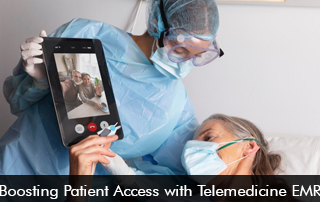The rapidly evolving technology landscape led to the quick adoption of Telemedicine EMR Software solutions. The era of virtual care was propelled by the worldwide COVID-19 pandemic, and everyone in the healthcare sector saw the massive benefits of the utilization of telemedicine software. The virtual care platform is preferred by patients for non-urgent issues that can be addressed from the comfort of their homes.
Using Telemedicine EHR Software to Improve Patient Access
Telemedicine Electronic Medical Records Software has opened doors for patients to receive timely and convenient care despite geographical barriers. For the telemedicine session to work effectively patients require a smartphone with stable internet connectivity. Virtual visits can address healthcare issues related to urgent care, dermatology, mental health, pediatric care, preventive care, etc. effectively.
The remote care platform can boost patient access by allowing patients to be examined for certain health issues, and monitor a patient’s treatment progress. During a telemedicine EMR Software session, the provider can also refer the patient to a specialist for personalized care.
Strategies that can Help Practices Improve Patient Access via Telemedicine Software
User-Friendly Software Telemedicine Platform
Patients wouldn’t be encouraged to use a platform that is difficult to use. Practices need to implement telemedicine electronic health records software that is intuitive and has a mobile app. The simple interface will allow patients of all age groups to easily use the platform.
Ensure Connectivity to Enhance Accessibility
Make certain that patients in underserved or rural areas may utilize telemedicine software services. This can be made possible by expanding broadband internet access to rural areas. Practices can accommodate varying patient preferences and technology capabilities by providing a range of contact channels, including video calls, phone conversations, and chat services.
Support Multiple Languages
Provide non-English speaking patients with assistance during consultations by including translation services into telemedicine EMR Software systems. This way diverse patient populations will not be ignored, increasing patient access to care.
Importance of HIPAA-Compliance in Telemedicine EHR Software
The Telemedicine Electronic Health Records (EHR) System must comply with legal and regulatory standards to ensure patient data privacy. A HIPPA Compliant Telemedicine Software will maintain patient data privacy during the online sessions.
The communication between the provider and the patient over telemedicine sessions needs to be encrypted to establish safe and ongoing patient-provider relationships. The robust encryption technology can protect data from being vulnerable and a target of cyber-attacks.
Moving Ahead
Telemedicine EMR Software is a valuable tool in today’s world. It can greatly enhance patient access, ensure medication adherence, and even help in the management of chronic conditions. The remote care platform can be leveraged to offer convenience to patients and ensure that high-quality patient care can be delivered anywhere.








